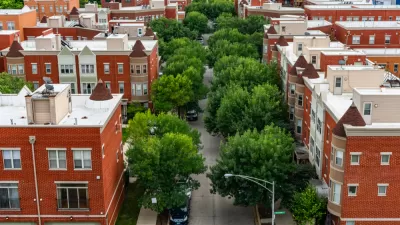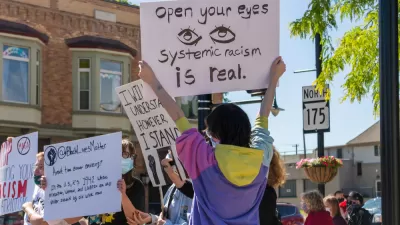On a holiday that commemorates the end of slavery in the United States, the White House marked the occasion by discussion exclusionary zoning.

In a remarkable moment that reveals how far the historical understanding of racism has come in recent years, an article on WhiteHouse.gov commemorates Juneteenth by examining the racial discrimination effect of exclusionary zoning.
Juneteenth, as explained in the article, marks the day a Major General of the Union Army arrived in Galveston, Texas to enforce the Emancipation Proclamation, and free the last enslaved Black people in Texas from bondage.
Given the historic significance of the date, and its increasing relevance as race continues to take central stage in the culture war, it might come as a surprise that zoning is on the mind of the Biden administration. The confrontation with the racism of the country in news media and politics at every level of government in recent years has include an account of the past discrimination and racism of planning policies.
While a nascent effort to undo some of the racist policies of the past is underway in some cities and states, much of which has focused on the exclusionary effects of single-family zoning, the idea zoning reform as a tool for equity is still relatively new in the halls of the federal government. The Biden administration has taken the cause of zoning reform to new levels of visibility by proposing a competitive grant program that would encourage cities to begin to dismantle the tools of exclusionary zoning. The Unlocking Possibilities Program would provide $5 billion in competitive grants as an incentivize for zoning reforms. (The Biden administration's Unlocking Possibilities Program closely follows the Housing Supply and Affordability Act proposed by Senator Amy Klobuchar (D-Minnesota), Senator Tim Kaine (D-Virginia), and Senator Rob Portman (R-Ohio) in March 2021.")
So, the White House Juneteenth article lays out the case for the program and for the movement.
"[I]t is imperative to not lose sight of the fact that we still have much work to do to address the vestiges of slavery and historic discrimination," reads the article. Exclusionary zoning, according to the article, is one of those policies and practices in existence today "that are seemingly non-discriminatory on their face but still negatively affect many families of color, especially Black families."
The article provides a history, full of links to research sources, about the evolution of exclusionary zoning as a tool of racism and discrimination.
FULL STORY: Exclusionary Zoning: Its Effect on Racial Discrimination in the Housing Market

Alabama: Trump Terminates Settlements for Black Communities Harmed By Raw Sewage
Trump deemed the landmark civil rights agreement “illegal DEI and environmental justice policy.”

Planetizen Federal Action Tracker
A weekly monitor of how Trump’s orders and actions are impacting planners and planning in America.

The 120 Year Old Tiny Home Villages That Sheltered San Francisco’s Earthquake Refugees
More than a century ago, San Francisco mobilized to house thousands of residents displaced by the 1906 earthquake. Could their strategy offer a model for the present?

In Both Crashes and Crime, Public Transportation is Far Safer than Driving
Contrary to popular assumptions, public transportation has far lower crash and crime rates than automobile travel. For safer communities, improve and encourage transit travel.

Report: Zoning Reforms Should Complement Nashville’s Ambitious Transit Plan
Without reform, restrictive zoning codes will limit the impact of the city’s planned transit expansion and could exclude some of the residents who depend on transit the most.

Judge Orders Release of Frozen IRA, IIJA Funding
The decision is a victory for environmental groups who charged that freezing funds for critical infrastructure and disaster response programs caused “real and irreparable harm” to communities.
Urban Design for Planners 1: Software Tools
This six-course series explores essential urban design concepts using open source software and equips planners with the tools they need to participate fully in the urban design process.
Planning for Universal Design
Learn the tools for implementing Universal Design in planning regulations.
Clanton & Associates, Inc.
Jessamine County Fiscal Court
Institute for Housing and Urban Development Studies (IHS)
City of Grandview
Harvard GSD Executive Education
Toledo-Lucas County Plan Commissions
Salt Lake City
NYU Wagner Graduate School of Public Service





























